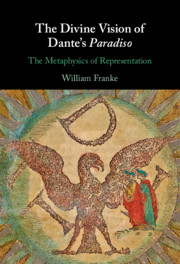Book contents
- The Divine Vision of Dante’s Paradiso
- The Divine Vision of Dante’s Paradiso
- Copyright page
- Contents
- Figures
- Prologue
- Acknowledgments
- Note on Translations and Primary Source Editions
- Part I The Literary Vision
- Part II Philosophical Reflections
- Excursus I Writing and Visionary Immediacy: Mechanics and Mysticism of the Letter
- Excursus II Saussure and the Structuralist Idea of Language as a System of Differences
- Excursus III Temporalization and Transcendence of Time through Language
- Excursus IV Transcendental Reflection: Time Synthesis and the Role of the “I”
- Excursus V Unmanifest Wholeness of Sense: Language as Image of the Imageless
- Excursus VI Transcendentality of Language and the Language of the Other
- Appendix Paradiso XVIII. 70–136
- Index
Excursus II - Saussure and the Structuralist Idea of Language as a System of Differences
from Part II - Philosophical Reflections
Published online by Cambridge University Press: 26 August 2021
- The Divine Vision of Dante’s Paradiso
- The Divine Vision of Dante’s Paradiso
- Copyright page
- Contents
- Figures
- Prologue
- Acknowledgments
- Note on Translations and Primary Source Editions
- Part I The Literary Vision
- Part II Philosophical Reflections
- Excursus I Writing and Visionary Immediacy: Mechanics and Mysticism of the Letter
- Excursus II Saussure and the Structuralist Idea of Language as a System of Differences
- Excursus III Temporalization and Transcendence of Time through Language
- Excursus IV Transcendental Reflection: Time Synthesis and the Role of the “I”
- Excursus V Unmanifest Wholeness of Sense: Language as Image of the Imageless
- Excursus VI Transcendentality of Language and the Language of the Other
- Appendix Paradiso XVIII. 70–136
- Index
Summary
Dante’s unitary vision, for all its immediacy, is a vision of mediation through language and its constitutive binaries. This is demonstrated in terms of Saussurian linguistics, but the principle had been anticipated with sophistication by the semiological and language-theoretical consciousness of the Middle Ages in ways that Dante particularly develops and foregrounds. Moreover, the post-structuralist turn in which meaning is generated no longer just internally to the system of language by diacritical difference but depends on relation to an Other outside the system is also eminently embodied in Dante’s theological understanding of language. Only relation to the absolute Other of divinity can lend language its meaningfulness. Every system must relate to other systems in order to have any meaning at all, and this is structurally equivalent to referring all meaning to God.
- Type
- Chapter
- Information
- The Divine Vision of Dante's ParadisoThe Metaphysics of Representation, pp. 199 - 205Publisher: Cambridge University PressPrint publication year: 2021

